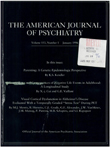Treatment goals, continuity of care, and outcome in a day hospital substance abuse rehabilitation program
Abstract
OBJECTIVE: Relationships between day hospital treatment goals, self- help group participation, and substance use outcome were examined for 180 alcohol- or cocaine-dependent male patients in a day hospital Veterans Administration substance abuse program. METHOD: The primary goals assessed were completion of the day hospital program and participation in posttreatment self-help groups. For subjects who completed the day hospital program, progress toward three other goals was also assessed: decreased denial, endorsement of 12-Step beliefs, and participation in self-help groups during the day hospital program. The outcome measures were urine toxicology and self-reports of alcohol or cocaine use at 4- and 7-month post-intake follow-up interviews. RESULTS: Day hospital completion and participation in posttreatment self-help groups predicted better outcome. Self-help participation also predicted outcome after day hospital completion was controlled. Among subjects who completed the day hospital program, the other three goals did not predict substance use outcome. However, involvement with self- help groups during the day hospital program and decreases in denial predicted continued involvement with self-help groups. CONCLUSIONS: Patients who complete day hospital substance abuse rehabilitation and then continue to participate in self-help groups are likely to have lower rates of alcohol and cocaine use during follow-up. Furthermore, the beneficial effect of self-help group participation does not appear to be strictly the result of motivation or some other patient characteristic.
Access content
To read the fulltext, please use one of the options below to sign in or purchase access.- Personal login
- Institutional Login
- Sign in via OpenAthens
- Register for access
-
Please login/register if you wish to pair your device and check access availability.
Not a subscriber?
PsychiatryOnline subscription options offer access to the DSM-5 library, books, journals, CME, and patient resources. This all-in-one virtual library provides psychiatrists and mental health professionals with key resources for diagnosis, treatment, research, and professional development.
Need more help? PsychiatryOnline Customer Service may be reached by emailing [email protected] or by calling 800-368-5777 (in the U.S.) or 703-907-7322 (outside the U.S.).



